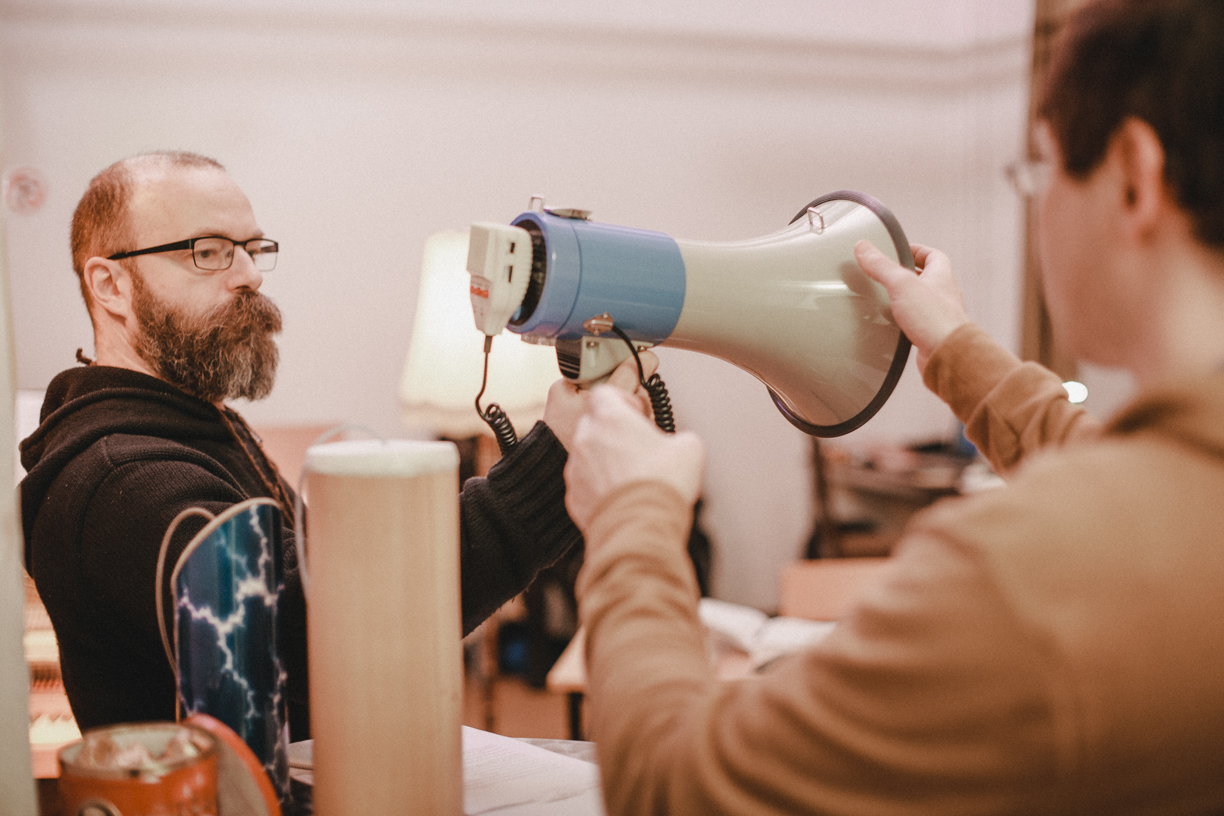Seit 2006 finden in der Lettrétage ca. 120 öffentliche Literaturveranstaltungen jährlich statt – Lesungen, Workshops, Diskussionsrunden, literarische Performances und Formate dazwischen. Bekannte und unbekannte Autor*innen und Künstler*innen verschiedener Sprachen und Nationalitäten sind hier schon aufgetreten.
Seit 2013 liegt der Programmfokus u.a. auf neuen Wegen der literarischen Präsentation und Live-Produktion: Dazu zählen u.a. die internationalen bzw. transnationalen Literaturfestivals „Soundout!“, „¿Comment!“, „Berlinisi“ und „Syn_Energy“, aber auch das viel beachtete Netzwerkprojekt „CROWD“ und multimediale Projekte wie die Reihe „CON_TEXT“ oder das „Poetry Audio Lab“. Eine vollständige Liste der Lettrétage-Projekte finden Sie hier.
Als Ankerinstitution für die freie Literaturszene Berlins stellt die Lettrétage außerdem ihre Räume für Literaturveranstaltungen aller Art zur Verfügung. Zahlreiche freie Veranstalter*innen nutzen unsere Infrastruktur regelmäßig – für Literatur-Workshops, Lesereihen in verschiedenen Sprachen und Buchpräsentationen. Mehr zu den Möglichkeiten der kostenlosen Raumnutzung erfahren Sie hier.
Auf dieser Seite präsentieren wir einen nicht vollständigen Einblick in unser vergangenes Programm.
Veranstaltungen
Termin Informationen:
-
So17Mrz202420:00 UhrLettrétage in der Veteranenstraße 21, Admission: 8,-/5,-
In the next city, the next country, the next language
ariel rosé and Uljana Wolf in reading and conversation with Karolina
Golimowska (moderation)
Copyright: privat Whereas Uljana Wolf’s first poetry collection, KOCHANIE TODAY I BOUGHT BREAD (2005) was inspired by a Polish-German translation workshop and explored the silences and gaps in German-Polish history during time spent in Kraków and Silesia, ariel rosé’s last poetry collections (MORZE NOCĄ JEST MIĘŚNIEM SERCA, 2022 and PÓŁNOC. PRZYPOWIEŚCI, 2019) were written outside of Poland — in Norway, in Berlin, in constant movement. How does changing one’s home change the relation to one’s poetic language? How does the fact that both poets work as translators influence their thinking about what home is, or origins and originals are, or whose history is to be translated, and where language belongs – and according to whom?
In conversation with translator Karolina Golimowska, ariel rosé and Uljana Wolf will read from their work in German, Polish and English and speak about the politics of translation, translanguaging, and exophonic writing.

Copyright: Alberto Novelli Uljana Wolf, born 1979, poet, translator, lives in Berlin. She has published five volumes of poetry, most recently MUTTERTASK (kookbooks 2023) and the essay collection ETYMOLOGISCHER GOSSIP (kookbooks 2021), which was awarded the Leipzig Book Fair Prize in the non-fiction/essay category. As a poetry translator, she has translated volumes of poetry from Eastern European languages and English, including by Christian Hawkey, Eugene Ostashevsky, Valzhyna Mort and most recently DMZ KOLONIE by Don Mee Choi (Spector Books 2023), nominated for the HKW International Literature Prize and the Hotlist Independent Publishers Prize. In the 2019 winter semester, she held the August Wilhelm von Schlegel Visiting Professorship for Poetics of Translation at the FU Berlin, and in May 2022 she curated the international literature festival POETICA VI in Cologne on the topic of SOUNDING ARCHIVES - POETRY BETWEEN EXPERIMENT AND DOCUMENT. Wolf teaches seminars on translation and poetry at the Institute for Language Arts, Vienna and the German Literature Institute Leipzig, among others.

Copyright: Valdis Jansons ariel rosé is a poet, essayist, translator and illustrator originally from Poland, resident of Norway, based in Berlin. They are the author and illustrator of the books MORZE NOCĄ JEST MIĘŚNIEM SERCA (the sea by night is a muscle of the heart, PIW, 2022) and PÓŁNOC. PRZYPOWIEŚCI (North: Parables, Znak, 2019), which had its launch at the Miłosz Festival (both published under the name Alicja Rosé). They translate poetry and prose from English, Italian, French, Norwegian, mand Spanish into Polish, as well as from Polish into English. As a resident of Norway, ariel was invited to attend the Norway Guest of Honor program of the Warsaw Book Fair in 2022. There, they presented Norwegian and Ukrainian poetry and led a meeting with the Norwegian poet Aina Villanger, which featured ariel’s translations of her poetry. In 2023, ariel collaboratively launched BOTH SIDES OF THE BORDER FACE EAST, an international arts initiative focused on Eastern/Central Europe. The project is under the patronage of Marci Shore and supported by the Fondation Jan Michalski and the Renaissance Institute. Its inaugural iteration was dedicated to the war in Ukraine. ariel also initiated WIERSZE NIE PŁONĄ (Poems Don’t Burn), a marathon reading of Ukrainian poetry with music, to raise funds for Ukrainian publishers.

Copyright: Andi Weiland Karolina Golimowska is a literary scholar, translator and author of short prose and journalistic texts. She curates and moderates literary events, including for the International Literature Festival in Berlin and the Haus für Poesie, and gives seminars on pop culture at the Freie Universität Berlin. You can find more detailed information on her website.
Workshops & Infoabende
Termin Informationen:
-
So29Sep201917:00Eintritt frei
Dem Frosch geht es gut.
Ungarisch-deutsche Haiku-Werkstatt mit Christine Schlosser und Peter Holland.

© Anna Farkas In kaum einer anderen Literatur haben sich in Vergangenheit und Gegenwart so viele große Lyriker*innen der kleinen Gedichtform angenommen wie in der ungarischen. In der Werkstatt möchten wir diese Seitentür in die ungarische Lyrik der letzten 100 Jahre öffnen.
Nach einer kurzen Einführung werden wir gemeinsam ungarische Haikus in Übersetzungen und Nachdichtungen lesen und diskutieren, bevor wir selbst tätig werden und uns an eigenen Übertragungen und Fortschreibungen versuchen – mithilfe von Interlinearversionen oder in ungarisch-deutschen Tandems.
Ungarisch-Kenntnisse sind nicht erforderlich, können und sollen aber sehr gerne eingebracht werden, wenn vorhanden.
Die Ergebnisse der Werkstatt können nach Wunsch zusammen mit den Teilnehmer*innen am darauffolgenden Abend in den ungarischen Haiku-Abend „So groß ist der Mond“ eingebracht werden. „So groß ist der Mond“ ist eine mehrsprachige, literarisch-performative Reise durch 100 Jahre ungarischer Haiku-Dichtung zum Hieronymustag, dem internationalen Tag der Übersetzung, am 30. September um 19 Uhr im Collegium Hungaricum (Dorotheenstraße 12, 10117 Berlin). Mehr Informationen hier.
